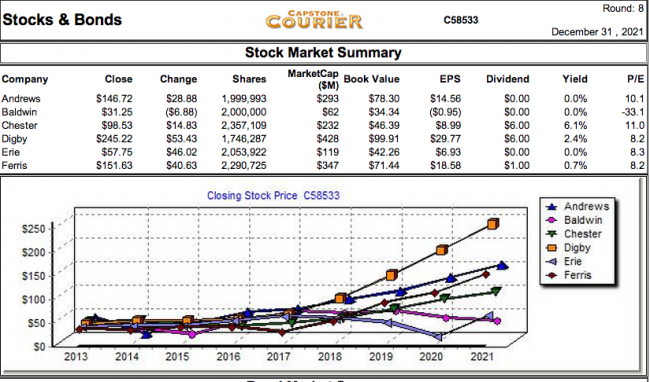The Train Wreck that was Corporate Strategy, and How I Survived
It’s not often that a class makes me shake a clenched fist in the air like some sort of old-timey grumpy old man, but Corporate Strategy was definitely one of those classes for me. It was not one of those “I’m learning so much about life, though” obstacles where you treasure the times when you beat your head against the wall because you know you’re growing and learning. The class and I just didn’t mix. I didn’t get it. We didn’t speak the same language. It was my nemesis. In addition, the course was completely centered around an online simulation (Capsim), in which students in groups of 3 were expected to make decisions about their virtual sensor company in order to increase ROI and profits. WHAT. I know what you’re thinking. “Oh, cool! What a great hands-on way to learn about business!” I’m sorry, my friend, but you do not know the struggle of wringing your hands over whether or not to spend more money on R&D or TQM and ending up with an emergency loan in the first round of the simulation. Despite all of this, I buckled myself in for the long ride that was the whole semester because Corporate Strategy was a required course for me. Let’s look past the fact that I’m a Corporate Strategy minor for a second and just focus on how I am DONE with this class forever, and WOW, I am still alive!

A lot of my life here at Vanderbilt revolves around group projects, which, day-to-day, looks like 10:45 pm meetings, Google Docs galore, throwing PowerPoints together like nobody’s business, team evaluations, and projects that eat up your life. But you really shouldn’t fret! I’ve compiled a guide to getting through group projects without too many scratches. After all, everyone says that business in the real world is just a giant group project. OH YAY.
*Much of this sage advice will apply to any group project-heavy course. I’m looking at you, HOD majors and Managerial Studies minors.
1. Make sure that the group you choose to work with all semester is one where someone knows what they are doing. Also, “I’ll learn to get along with that person” doesn’t work out, especially when stress levels are high. I didn’t really run into the problem of conflicting personalities in Corporate Strategy, but between my two teammates and me, none of us knew how to work the Capsim simulation to our benefit. There was a lot of trial and error, and as the course was completely based off of simulation results, our grades showed this.
2. Decision-making fatigue is REAL. If at all possible, schedule meetings for early afternoon and not for 11:00pm. Group meetings will inevitably run an hour longer than expected, and I am very familiar with making foolish decisions because I just want to pack up my things and return to watching Modern Family on Hulu.

3. Have a set meeting time each week in the same place. “We’ll work it out over the group text” does not work. My group met on Sunday afternoons in Rand every week, and because this meeting was always at the same time, we did not run into the problem of people scheduling other events or meetings at that same time.
4. Go to office hours, even if you don’t want to. My group got into the habit of compiling questions we had for the professor during our group meetings, and then a few of us would go into office hours and talk over our simulation problems with him in time to make vital changes to decisions before they were due on Tuesday night. What I’ve found is that professors want to help their students, but you have to make the effort to ask for help in order to receive it.
5. Reflection upon past mistakes and lessons learned is valuable. Our professor for Corporate Strategy required all of the groups in our class to do 3 weeks of written reflection on the results from the previous week with lessons learned and changes to make for the next round. At the time, it seemed just like busy work, but it helped immensely to have take-aways written down. We were more likely to avoid those mistakes in the future. I would recommend documenting everything that goes down in group meetings, really, because this can be helpful if questions arise that you need to address in office hours or in evaluating peers at the end of the project.
6. Enthusiasm in presentations can go a long way. In the final few weeks of the course, our groups were required make presentations on business books that we read that related to the course content. My group, in the interest of choosing a book we would enjoy reading, chose A Whole New Mind by Dan Pink, and the corresponding PPT we made was visually appealing and full of class participation activities and questions. In delivering our grade, our professor noted that our enthusiasm and energy during the presentation really made it stand out. Hooray for a voice that carries and passion about the right side of the brain!
7. It’s only a grade. It’s only a test. It’s only one course. The two other girls in my group were full of optimism and knew how to laugh at mistakes that we made, which is what really got me through this group project. In the grand scheme of things, a slightly lower grade in Corporate Strategy is not a life-ruiner. If anything, it taught me to work hard to understand a new financial language and online system, and I feel more prepared to take on my next, inevitable group project.
